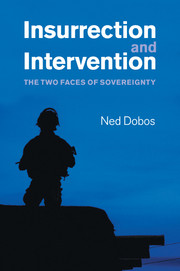Book contents
- Frontmatter
- Contents
- Acknowledgements
- Introduction
- Chapter 1 Communal self-definition
- Chapter 2 Costs and consequences
- Chapter 3 Asymmetries in jus ad bellum
- Chapter 4 Asymmetries in jus in bello
- Chapter 5 Humanitarian intervention and national responsibility
- Chapter 6 The issue of selectivity
- Chapter 7 Proper authority and international authorisation
- Conclusion
- Select bibliography
- Index
Introduction
Published online by Cambridge University Press: 05 November 2011
- Frontmatter
- Contents
- Acknowledgements
- Introduction
- Chapter 1 Communal self-definition
- Chapter 2 Costs and consequences
- Chapter 3 Asymmetries in jus ad bellum
- Chapter 4 Asymmetries in jus in bello
- Chapter 5 Humanitarian intervention and national responsibility
- Chapter 6 The issue of selectivity
- Chapter 7 Proper authority and international authorisation
- Conclusion
- Select bibliography
- Index
Summary
Domestic sovereignty (the right of a government not to be resisted by its subjects or citizens) and international sovereignty (a state’s moral immunity against outside intervention) were once both widely believed to be absolute. This is no longer the case. Few contemporary theorists cling to the view that military intervention in a sovereign state’s internal affairs is always impermissible, and even fewer endorse an unqualified ban on rebellion. But international sovereignty has not been eroded to nearly the same extent as domestic sovereignty. There is a reluctance to accept that foreign intervention is even prima facie justified wherever insurrection is. The US-led war to ‘liberate the Iraqi people’ was widely condemned, but it is inconceivable that efforts by the Iraqi people to liberate themselves would have been met with such opposition. Neo-conservatism seems to have been largely discredited in the public consciousness by its foreign policy of forcible democratisation. But an oppressed people’s right to fight for democratic reforms in their own country remains unchallenged, as the international responses to the revolutions in Tunisia, Egypt and Libya illustrate. The prevailing view, then, is that armed intervention is not always justified even where rebellion with similar aims, employing similar means, is acknowledged to be a legitimate option for the victims of tyranny. Insurrection and Intervention assesses the moral cogency of this double standard by subjecting to philosophical scrutiny the various arguments that might be advanced in support of it.
Insurrection then
During the Later Roman Empire the prevailing political arrangements of earthly societies – particularly those that took the form of absolute monarchies – were believed to have been crafted by God in accordance with the ordering of the celestial kingdom. The monarch was divinely empowered, and his subjects were divinely consigned. From the nobleman to the farmer, each individual had been assigned his place by God. To intentionally disrupt these arrangements was therefore tantamount to challenging the Creator’s will, and resisting the monarch was on par with resisting God himself. To quote St Paul:
We should obey the powers that be [because] they are ordained of God and that whosoever resisteth the power resisteth the ordinance of God, and they that shall resist shall receive to themselves eternal damnation.
Martin Luther, though willing to concede a right of passive disobedience in cases where the directives of government contravened the divine law, maintained that the civil authorities were not to be actively resisted or overthrown under any circumstances. For ‘even if the princes abuse their power, yet they have it of God, and under their rule the Kingdom of God at least has a chance to exist’. Fellow reformer John Calvin taught that a wicked king was God’s way of punishing a sinful people, and that obedience was therefore owed even to tyrants.
- Type
- Chapter
- Information
- Insurrection and InterventionThe Two Faces of Sovereignty, pp. 1 - 26Publisher: Cambridge University PressPrint publication year: 2011



